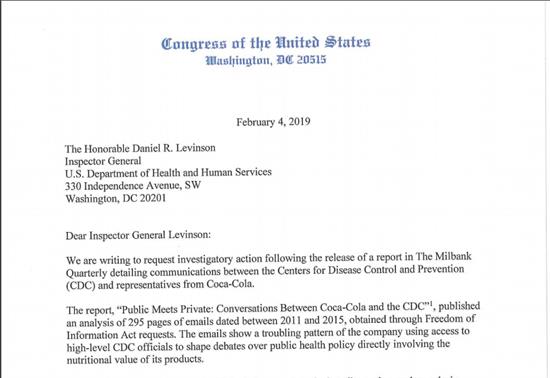Today, Congresswomen Chellie Pingree (D-Maine) and Rosa DeLauro (D-Connectitut) wrote to the U.S. Department of Health and Human Services Inspector General and requested an investigation into reports that Coca-Cola inappropriately influenced public health policy through relationships with high-level Centers for Disease Control and Prevention (CDC) officials, including by pushing industry-backed research.
Last week, The Milbank Quarterly published a report with email exchanges between Coca-Cola and CDC officials which raised questions about how agency priorities are being influenced by industry-funded research. The exchanges were discovered through a Freedom of Information Request (FOIA)
“Though we recognize the role of public-private partnerships in advancing the agency’s broad public health goals, this report demonstrates Coca-Cola’s conflicts of interest in engaging with CDC staff on nutrition policy,” the lawmakers wrote. “CDC’s Guiding Principles for Public-Private Partnerships advises staff to avoid partnerships with a representative of “any product that exacerbates morbidity or mortality when used as directed.” Given that decades of peer-reviewed research has established links between soft drink consumption and negative health outcomes like obesity, heart disease, and type 2 diabetes, it is clear that the Coca-Cola’s influence is inappropriate and must be probed further.”
Full text of the letter is below and a scanned copy is here.
February 4, 2019
The Honorable Daniel R. Levinson
Inspector General
U.S. Department of Health and Human Services
330 Independence Avenue, SW
Washington, DC 20201
Dear Inspector General Levinson:
We are writing to request investigatory action following the release of a report in The Milbank Quarterly detailing communications between the Centers for Disease Control and Prevention (CDC) and representatives from Coca-Cola.
The report, “Public Meets Private: Conversations Between Coca-Cola and the CDC”, published an analysis of 295 pages of emails dated between 2011 and 2015, obtained through Freedom of Information Act requests. The emails show a troubling pattern of the company using access to high-level CDC officials to shape debates over public health policy directly involving the nutritional value of its products.
In one example, Coca-Cola used self-funded epidemiological studies on low and no calorie beverages to argue to CDC staff that “associations between diet beverages and weight… is likely the result of reverse causality.” It is deeply concerning to see CDC engage with data coming from the company on a question so fundamental to its bottom line – especially when data show that outcomes from industry-sponsored research differ significantly from independent studies.
In another exchange, a Coca-Cola executive requested and received advice from a CDC official on how to best approach the World Health Organization director-general perceived as a “threat to our business” for naming soft drink manufacturers as contributors to global obesity.
Though we recognize the role of public-private partnerships in advancing the agency’s broad public health goals, this report demonstrates Coca-Cola’s conflicts of interest in engaging with CDC staff on nutrition policy. CDC’s Guiding Principles for Public-Private Partnerships advises staff to avoid partnerships with a representative of “any product that exacerbates morbidity or mortality when used as directed.” Given that decades of peer-reviewed research has established links between soft drink consumption and negative health outcomes like obesity, heart disease, and type 2 diabetes, it is clear that the Coca-Cola’s influence is inappropriate and must be probed further.
The CDC has an essential mission. Its pursuit of evidence-based public health policy is fundamental to the safety and well-being of all Americans. As we face an unprecedented obesity epidemic, we must ensure that the public can trust the agency to promote quality and objective data – particularly when it conflicts with powerful industry interests.
Therefore, in your capacity as Inspector General, we ask that you investigate the relationship between the CDC and Coca-Cola outlined in this report, determine whether there is a broader pattern of inappropriate industry influence at the agency, and make recommendations to address this issue.
We appreciate your prompt attention to this matter. If you have any questions, please do not hesitate to contact our staff.
Sincerely,
CHELLIE PINGREE ROSA L. DELAURO
Member of Congress Member of Congress
Hessari, Nason Maani, et al. “Public Meets Private: Conversations Between Coca-Cola and the CDC.” The Milbank Quarterly, Jan. 2019, www.milbank.org/wp-content/uploads/mq/Volume-97/Issue-1/HESSARI_et_al.pdf.
Vartanian, Lenny R, et al. “Effects of Soft Drink Consumption on Nutrition and Health: A Systematic Review and Meta-Analysis.” American Journal of Public Health, vol. 97, no. 4, Apr. 2007, ajph.aphapublications.org/doi/full/10.2105/AJPH.2005.083782.

